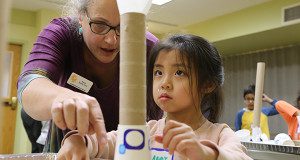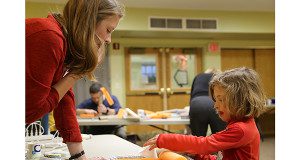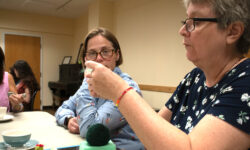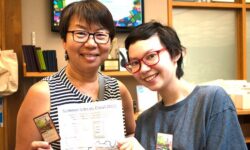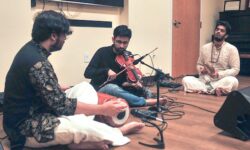[ccfic caption-text format="plaintext"]
By Alex Oliveira
Hometown Weekly Reporter
On Wednesday the 16th, The Dover Town Library and the Charles River School hosted their first of a now-ongoing STEM program (STEM standing for science, technology, engineering, and math).
With inspiration from the Nancy E. Shaw book “Sheep in a Jeep,” the story of a pair of sheep careening down hill in a playfully out-of-control Jeep, about 13 kids, ages five to seven, learned how gravity works and built marble slides to explore Newton’s universal law firsthand.
After a reading of “Sheep in a Jeep,” Charles River School pre-kindergarten teachers Claire McCulloch and Karen Pratt asked their audience: “There’s a special word for what makes things go down. Who knows what it is?”
Exclamations like “Hill!” and “Slide!” came from the kids, until a boy named William confidently stated: “Gravity.”
“That’s right, and today we’re going to learn about gravity by building our own marble slides,” said Pratt, to cheers from the crowd.
From there, the kids rushed to a table piled high with cardboard tubes, conical cups, construction paper and marbles, and got to work assembling an array of slides that ranged from straight and simple shoots to towering, turning tracks that sent marbles tumbling throughout the room.
“The idea was to give the kids time to really experiment,” said Charles River School Director of Technology Steve Trust, “We started the kids off, but most of this was letting them explore and figure things out.”
STEM stands for science, technology, engineering, and math, and is part of a teaching method designed to kindle critical thinking in students with a hands-on approach to learning. With the collaboration of the Dover Library, Trust says the goal is to hold STEM events on a regular basis.
“This is our first time doing it,” he said. “This is our opening one. We’re going to try it out, see what works and doesn’t. For now, we’re shooting for once a month, once every couple of months.”
Future STEM events at the Dover Library will be catered to students ranging in age from pre-Kindergarten up through middle school.
This program was supported by grants from MathWorks and Mass Cultural Council.






